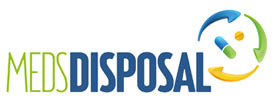The disposal of unused and/or out of date medicines varies across European countries. You can find information on medicines disposal schemes in different European countries at www.medsdisposal.eu
FAQ
How & where should I dispose my unused or out of date medicines ?
What happens to medicines returned to pharmacies or other dedicated collection points?
Unused and expired medicines, returned to pharmacies or dedicated collection points, are taken back by the pharmaceutical distribution. Thanks to reverse logistics, which collects pharmaceutical waste after delivery of medicines and prevents vehicles from returning empty, distributors ensure that the waste is transported to be properly destroyed by a specialized company.
A medicine includes not only the active substance, but all the chemical compounds that make it cohesive and help in its delivery in the human body. The primary and secondary packaging, the information leaflet and the ancillary devices are also considered part of the medicinal product.
The practical methods for recycling all these elements may vary depending on the country and the standards in force. For example, some countries would recommend people to bring back only the medicines and their primary packaging (e.g., blister) and to put the secondary packaging (the cardboard) with the regular wastepaper and the ancillary devices (if recyclable) with the plastic waste. Some other countries will collect everything (medicines and their primary and secondary packaging) and sort the recyclable parts in collaboration with a recycling centre. Other countries may also collect everything and send it all for incineration, since incineration also needs bulk combustible compounds to be effective.
The recycling of active substances or chemical compounds of a medicine is not done. This is because there is no science or technology for an efficient process that would not be a waste of resources. The best way to completely eliminate these substances is by incineration. This prevents them from ending up and accumulating in the environment, where it would not normally exist in high concentrations.
Please see our interactive map to find out what to do with your expired or unused medicines in your country. If you would like to know how medicines are eliminated in your country, the relevant local authorities can provide you with more information.
Why can't I just flush my medicines down the toilet or sink ?
Medicines can enter the environment via sewers and increase exposure to for example aquatic organisms. Research is continuously being carried out to evaluate any potential risks, however human medicines are meant for people and therefore their unnecessary exposure in the environment should be minimised. Click here to find out how to safely dispose of medicines in your country
Are expired medicines dangerous ?
Manufacturers guarantee the quality, safety and efficacy of medicines up until their expiry date as long as they are preserved according to instructions. After this it cannot be guaranteed, which means the medicine may not work as originally intended
I'm confused about some of the medicines I have, if I need them or not. What should I do ?
Ask your pharmacist or doctor
How can I help raise awareness about appropriate medical disposal in Europe ?
You can take part in the #medsdisposal campaign by talking about it to your friends and family, sharing the video, social media pages and website of the campaign or tweeting using the #MedsDisposal hashtag. If you represent an association or other body interested in the topic, you can also endorse the campaign.

